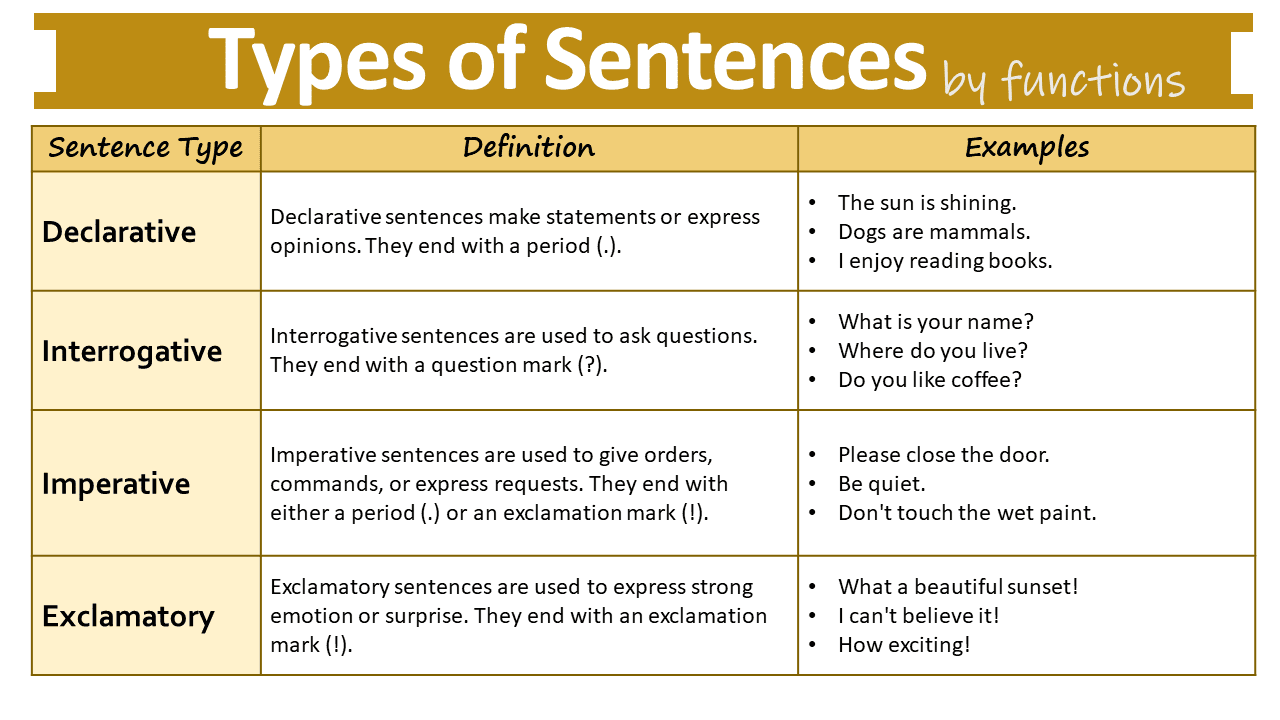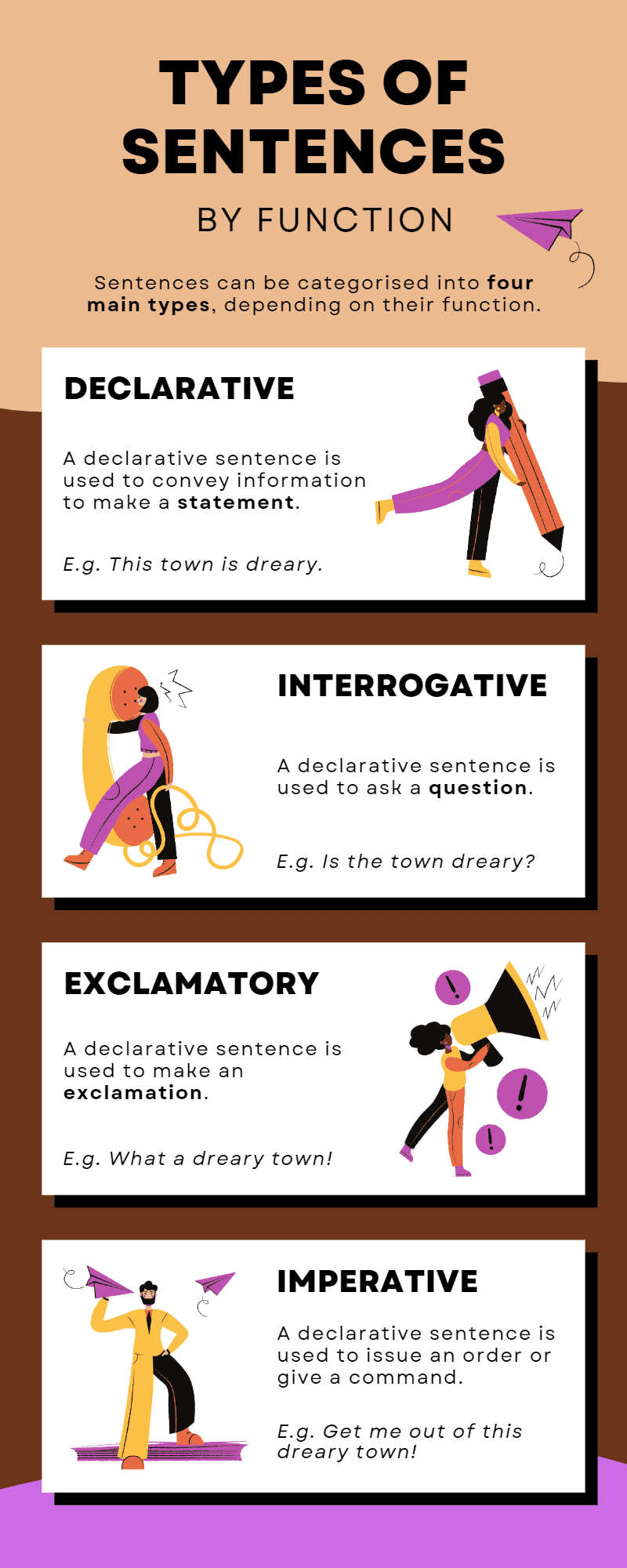When learning a language, understanding the structure and purpose of sentences is paramount. In English, sentences are categorized by their function into four main types: declarative, interrogative, imperative, and exclamatory. Each type serves a different purpose and is used in a variety of situations. This blog will delve into each type, offering easy-to-understand explanations and examples to help English learners at all levels.
4 Types of Sentences and Their Examples
1. Declarative Sentences (Statements)
The most common type of sentence is the declarative sentence. These sentences make statements or express opinions. They are used to convey information, and their main purpose is to state facts or beliefs. They end with a period (.) in written English.
Examples of Declarative Sentences:
- The sky is blue.
- My cat loves to play with yarn.
- London is the capital of the UK.
- Coffee is my favorite morning drink.
- John and I are going to the movies.
- It is raining outside.
- Alice is studying to become a doctor.
- You are a great friend.
- This restaurant has the best pasta in town.
- We will visit the museum tomorrow.
2. Interrogative Sentences (Questions)
Interrogative sentences, as the name suggests, are used to ask questions. They are used to gather information and typically start with a ‘wh-‘ word (like what, where, when, why, who) or a helping verb like do, is, are, etc. These sentences end with a question mark (?).
Examples of Interrogative Sentences:
- What is your name?
- Where do you live?
- When is the meeting scheduled?
- Why are you late?
- Who is your favorite author?
- Do you like pizza?
- Is she coming to the party?
- Can you help me with this task?
- Are you attending the conference?
- Have you finished your assignment?
3. Imperative Sentences (Commands/Requests)
Imperative sentences are used to give orders, commands, or express requests. They often omit the subject, as it is generally understood to be ‘you’. These sentences can end with either a period (.) or an exclamation mark (!), depending on the urgency or intensity of the command.
Examples of Imperative Sentences:
- Close the door.
- Please help me with the dishes.
- Be quiet during the performance.
- Turn off the lights when you leave.
- Always remember to brush your teeth.
- Try to finish your work on time.
- Stop shouting!
- Pass me the salt, please.
- Don’t touch the wet paint.
- Listen carefully to the instructions.
4. Exclamatory Sentences (Expressing Strong Emotion)
Exclamatory sentences are used to express strong emotion or surprise. They can be declarations, commands, or questions, but they always express intense feelings. These sentences end with an exclamation mark (!).
Examples of Exclamatory Sentences:
- What a beautiful sunset!
- I can’t believe you won the lottery!
- That was the best concert ever!
- Be careful!
- Congratulations on your promotion!
- I’m so excited for the vacation!
- Watch out for the car!
- I’m really proud of your accomplishments!
- That’s absolutely fantastic!
- I’ve never seen such a huge crowd!
Question Tags of Types of Sentences by Function
Adding question tags to each of the four types of sentences can change their function and meaning. For clarity, it’s important to note that question tags are typically added to declarative sentences to seek affirmation or clarification.
However, for the sake of understanding, let’s see how question tags can be used with each type of sentence:
- Declarative Sentences
| Sentence | Sentence with Question Tag | Possible Answer |
|---|---|---|
| It’s a beautiful day. | It’s a beautiful day, isn’t it? | Yes, it is. |
| You live in London. | You live in London, don’t you? | Yes, I do. |
| She’s a doctor. | She’s a doctor, isn’t she? | Yes, she is. |
| We’ve met before. | We’ve met before, haven’t we? | Yes, we have. |
| He doesn’t like coffee. | He doesn’t like coffee, does he? | No, he doesn’t. |
- Interrogative Sentences
Question tags aren’t typically used with interrogative sentences, as they are already questions. However, one can theoretically add a tag to a question to express surprise or disbelief:
| Sentence | Sentence with Question Tag | Possible Answer |
|---|---|---|
| Is it raining? | Is it raining, isn’t it? | Yes, it is. |
| Do you like pizza? | You like pizza, don’t you? | Yes, I do. |
| Can she play the guitar? | She can play the guitar, can’t she? | Yes, she can. |
- Imperative Sentences
Imperative sentences don’t usually have question tags because they are commands or instructions. However, in informal English, we can use a question tag “will you” or “won’t you” to soften a command or request:
| Sentence | Sentence with Question Tag |
|---|---|
| Close the door. | Close the door, will you? |
| Please be quiet. | Be quiet, won’t you? |
| Don’t forget your umbrella. | Don’t forget your umbrella, will you? |
- Exclamatory Sentences
Like imperative sentences, exclamatory sentences don’t usually have question tags. They’re used to express strong emotion, and adding a question tag to them is rare and can change the sentence’s meaning:
| Sentence | Sentence with Question Tag |
|---|---|
| What a beautiful sunset! | It’s a beautiful sunset, isn’t it? |
| I can’t believe it! | You can’t believe it, can you? |
| How exciting! | It’s exciting, isn’t it? |

